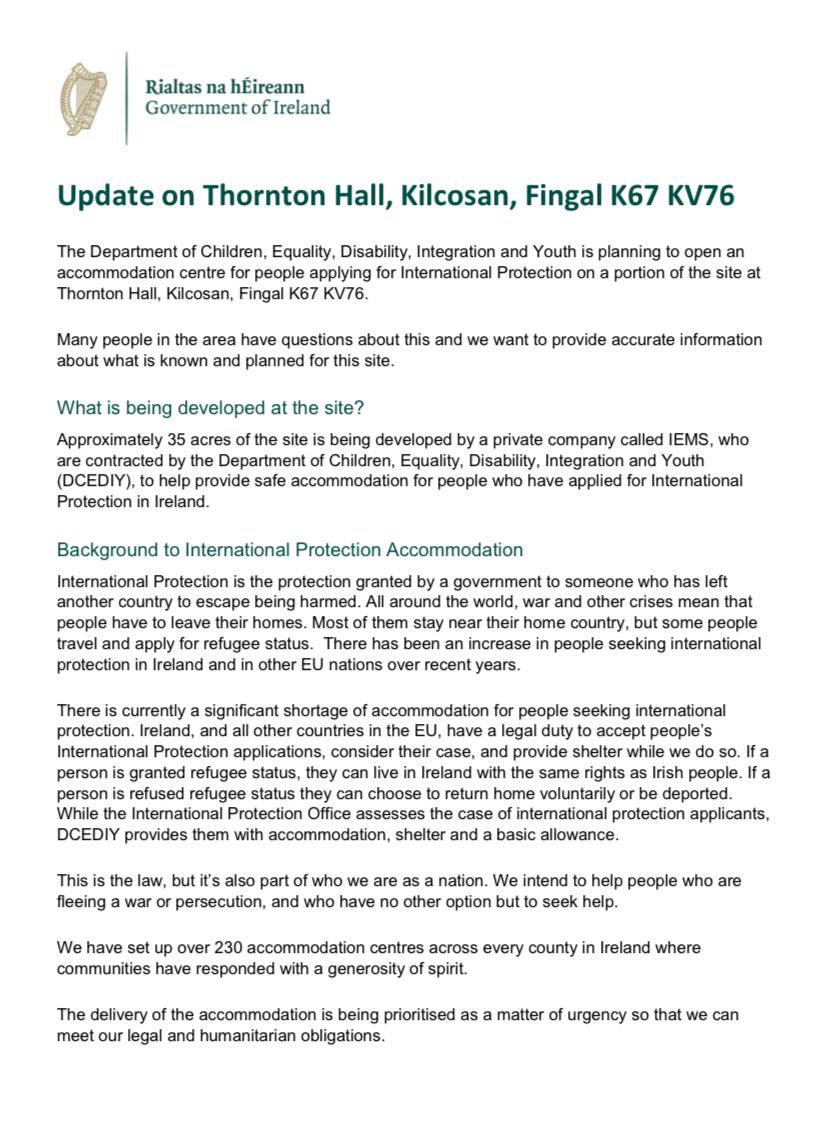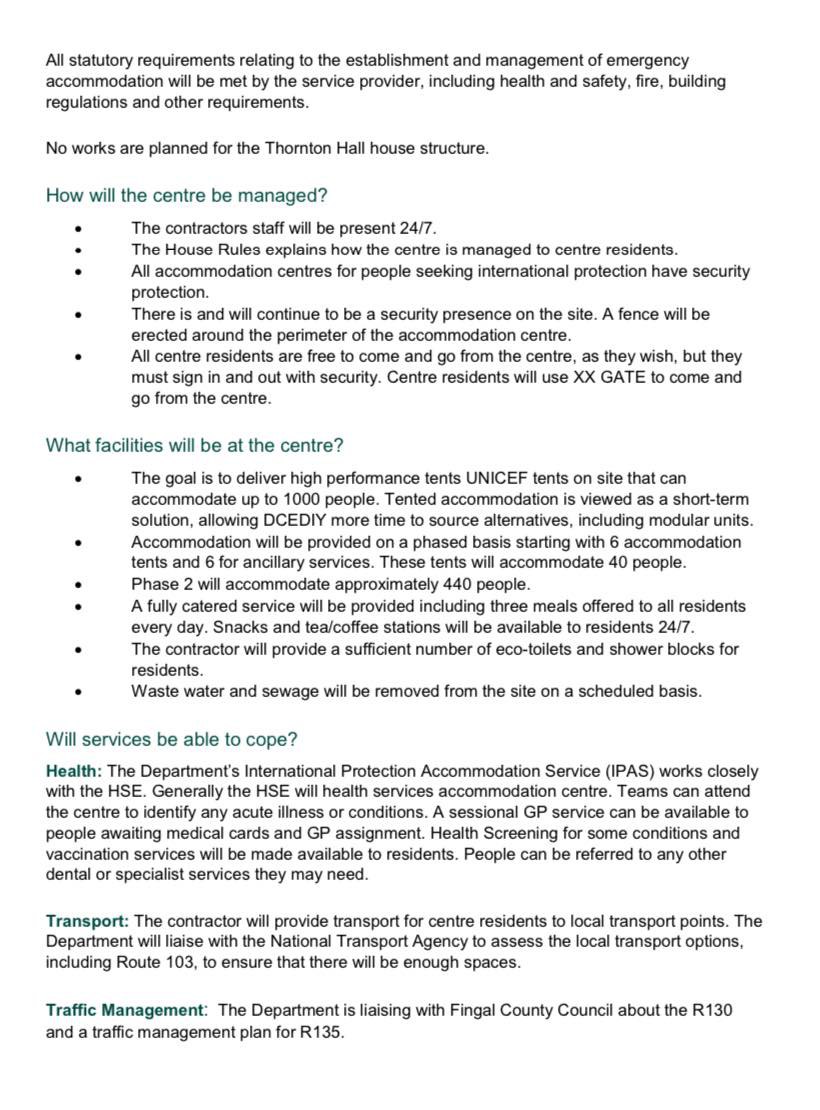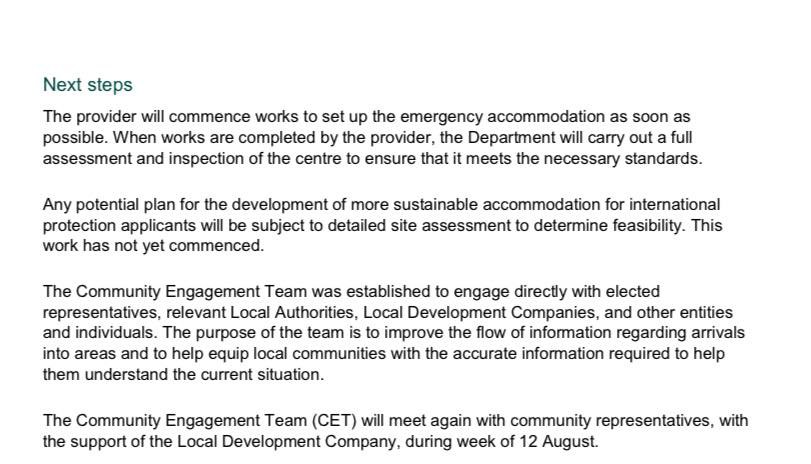Information regarding the plans which the Department of Children, Equality, Disability, Integration and Youth (DCEDIY) have for refugee accommodation at the Thornton Hall site in north county Dublin have come to light.
Details of the plans, which seem to indicate that the Department intends to press ahead with the opening of the site soon, have been posted on social media by a number of public representatives over the past two days.
The circular states that the 35 acre site, which was at one time intended to be used as a prison, is being developed by a “private company called IEMS.” There appears to be no such company registered with the Company Registration Office in Dublin and there is a possibility that the company concerned may be a UK based facilities management company but we are yet to confirm that. The land itself is owned by the state.
It is clear from the Department document that those to be accommodated at the site will be persons who have applied for International Protection and will come under the responsibility of IPAS.
The tone of the document would indicate that it is intended to open the site to residents soon. It will proceed in several phases beginning with the accommodation of 40 people in 6 tents. Phase Two will see the number of residents increased to approximately 440.
The tents in question are described as “high performance UNICEF tents” presumably of the type that are used to accommodate refugees fleeing wars and similar crises in the Middle East and other parts of the world.
According to the circular: “The tented accommodation is viewed as a short-term solution, allowing DCEDIY to source alternatives, including modular units.” It is envisaged that the Thornton Hall site at Kilcosan will be able to “accommodate up to 1000 people.”
Which has come as alarming news to the local community close to the site, who have already made it clear in a series of public meetings, protests and representations to the Department and to local elected representatives that they are unhappy with the plan.
Yesterday, Meath East Sinn Féin TD voiced his disappointment that there had been no proper consultation with the communities on either side of the north county Dublin/south Meath border. Fingal Councillor Patrick Quinlan expressed his disappointment and said that a promised response to a query from him to the Department made in July had not been delivered.
Thornton Hall also raises other interesting questions. This is clearly part of the state’s plan to use public land, and where possible publicly owned buildings, to accommodate those claiming to be refugees. The management and operation of the site will then be contracted to private companies such as the above named IEMS.
One of the questions is how long it is envisaged to maintain such sites. While the DCEDIY circular refers to temporary in regard to the initial use of UNICEF tents the fact that they plan to install modular units would imply that the accommodation, and perhaps the residents themselves, are there for the long term.
Unless of course the current government proceeds with the recommendations of the White Paper on Direct Provision and quickly moves such applicants into local authority and publicly supported private rental accommodation. Something that was supported by opposition parties such as Sinn Féin and the migrancy NGOs.
The opposition left and NGOs were actually demanding a more radical plan and a more rapid implementation of the “own key” proposals. It is unlikely that either the government parties or Sinn Féin would be anxious to be seen to advocate that as we prepare for a general election perhaps later this year.
The other interesting question harks back to documents secured under a Freedom of Information request by Ken Fox in January 2023. Internal emails and documents from within Minister Roderic O’Gorman’s Department contained some of the proposals that were being made in the immediate aftermath of the influx of Ukrainian refugees.
Interestingly, a November 2022 email referred to the use of modular homes and envisaged their use not only for Ukrainians but for persons claiming International Protection. Even more radically, another email wondered: “Longer term should we be building two new cities ‐15 minute ones ‐not just for Ukrainians. Could also bring developers on Board to build fast housing,”
While the current plans to install huge sites containing modular homes might appear to be more modest than the creation of “15 minute cities,” all great plans must begin somewhere.
Even if the initial new towns – which is what they are let us face it, and larger than the nearest local villages – might come to resemble more a Johannesburg shanty rather than a glamourous prospectus for a 15 minute high tech metropolis, they are no less utopian. Or ought that be dystopian?
Anyway, you will be able to judge for yourselves as they begin to be rolled out.
Credit: Councillor Patrick Quinlan



